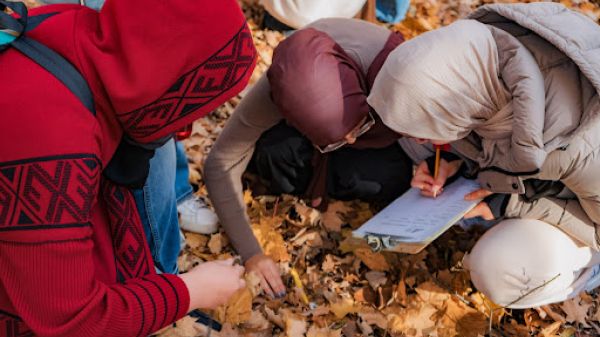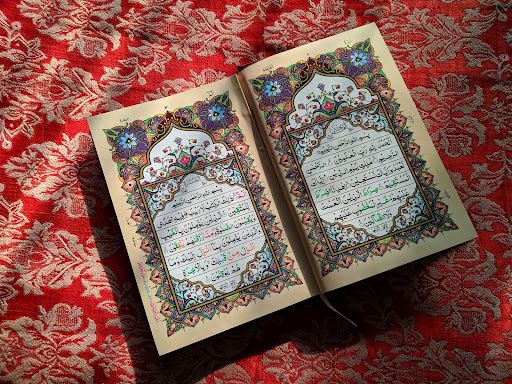Spirituality, Sustainability, and the Environment: An Islamic Perspective

This post was written by guest writer, Shazia Ghafur.
Environmental Education and social change are integral parts of Islamic teachings and history. To understand Islam’s connection with the environment, we will need to take a look at the source of Islamic teachings, the Qur’an.
The Qur’an is the holy book of the Islamic faith as revealed to the Prophet Muhammad over a period of 23 years in the 1400s. Comparing museum copies to current texts, the Arabic texts, letter for letter, have remained the same today. The Qur’an contains an entire worldview and framework for approaching every aspect of life. This includes frameworks regarding community development, lessons on leadership, finances, kindness/etiquette, human rights, legal frameworks and respect for all lifeforms.
As Muslims, we pair the teachings of the Qur’an with the Sunnah, which are the sayings and actions of the Prophet Muhammad that exemplify the teaching of the Qur’an. The Islamic worldview uniquely positions a believer to connect their understanding, their place, and their interactions in this world with a higher purpose—which is to show gratitude (mainly through prayers) to Allah (God), for all the blessings that God created. Some of these blessings are the air we breathe, the sun for warmth, water to quench our thirst, and people to socialise with and form communities with.
Let’s take a look at a few verses to understand Islam’s connection to environmental education.
Communities
وَمَا مِن دَآبَّةٍۢ فِى ٱلْأَرْضِ وَلَا طَـٰٓئِرٍۢ يَطِيرُ بِجَنَاحَيْهِ إِلَّآ أُمَمٌ أَمْثَالُكُم ۚ مَّا فَرَّطْنَا فِى ٱلْكِتَـٰبِ مِن شَىْءٍۢ ۚ ثُمَّ إِلَىٰ رَبِّهِمْ يُحْشَرُونَ ٣٨
(English translation) “And there is no creature on (or within) this earth or bird that flies with its wings except (that they are) communities like you…”—Qur’an 6:38.
Chapter 6, verse 38, talks about communities. This quote reminds us of our similarities with creatures on this planet, where we all have families and communities. It reminds us that plants and animals hold complex relationships with one another. It’s a statement made to humble us, we are all alike and have the same needs, and we all need each other.
Ozone Layer
وَجَعَلْنَا ٱلسَّمَآءَ سَقْفًۭا مَّحْفُوظًۭا ۖ وَهُمْ عَنْ ءَايَـٰتِهَا مُعْرِضُونَ ٣٢
(English translation) “And We made the sky a protected ceiling...”—Qur’an 21:32.
This verse speaks about the ozone layer that protects us from harmful UV radiation.
Plant Genetics
وَمِن كُلِّ ٱلثَّمَرَٰتِ جَعَلَ فِيهَا زَوْجَيْنِ ٱثْنَيْنِ ۖ
(English translation) “... And of all the fruits, he has made it in two kinds”—Qur'an 13:3.
This verse mentions plant genetics; plants that reproduce sexually instead of asexually have two genders, a male and female. That is what is referred to in this verse. It is this process that allows for genetic diversity within a species and thus the slight changes can provide resilience against diseases.
Water
وَٱللَّهُ أَنزَلَ مِنَ ٱلسَّمَآءِ مَآءًۭ فَأَحْيَا بِهِ ٱلْأَرْضَ بَعْدَ مَوْتِهَآ ۚ
(English translation) “And Allah Has sent down rain from the sky and given life thereby to the earth after it’s lifelessness...”—Qu’ran 16:65.
Personally, I believe water is one of the most fascinating molecules we have on Earth. It floats when frozen which is unusual as most molecules become denser, and will sink when frozen. As mentioned in this verse, water gives life. In Islam, water is held with utmost respect, noted never to be wasted even a drop, to conserve the use of it when we wash 5 times a day before prayers. Water gives life in many ways, it quenches the thirst of living creatures, it provides internal calmness when you are near it, which is good for mental and physical health. It delivers the nutrients by dissolving the minerals from the soils to be sucked up by plant roots and make them grow. Water is a mode of transportation, via our river systems. These are some of the many ways water gives life.
Mountains
وَٱلْجِبَالَ أَوْتَادًۭا
(English translation) “And the mountains are as pegs?”—Qur’an 78:7, and
وَأَلْقَىٰ فِى ٱلْأَرْضِ رَوَٰسِىَ أَن تَمِيدَ بِكُمْ وَأَنْهَـٰرًۭا وَسُبُلًۭا لَّعَلَّكُمْ تَهْتَدُونَ ١٥
(English translation) “And He has set up on the Earth mountains standing firm, lest it should shake with you, and rivers as roads that ye may guide yourselves.”—Qur’an 16:15.
Here, it mentions that mountains are not just ground structures, they have roots like pegs in the earth, that keep the ground stabilized. This was discovered in the 1800s during the expeditions of map making of our human history timeline.
As I reflect on these passages as an Environmental Scientist, I marvel at the complexities of these systems and how much needs to go right and in synchrony for them to run smoothly. It is interesting to see them referenced in a book so old. Some knowledge does get lost in time, like the knowledge of the Mayans and Aztecs. The Qur’an urges us to reflect on the natural environment and to learn about them in depth, to give you an appreciation of their complexities and ponder about God, who Muslims believe is the Creator and Designer of the Earth. Earth is beautiful, complex, and perfectly crafted with precision to support life (as we know it). As a Muslim, that is perpetually studying the environment, it ceases to amaze me that the more in depth that I study, the more I realise how complex and precise everything is. The more I learn, and the more I re-read the Qur’an, and see it reflected in the passages of the Qur’an the more I feel obliged to follow the teachings of Islam, which mandates the care for all biotic and abiotic matter on this Earth.
The Qur’an calls on us to be a Khalifa on Earth. It is a natural invitation for humanity to practice faith through action. The Qur’an mentions, وَإِذْ قَالَ رَبُّكَ لِلْمَلَـٰٓئِكَةِ إِنِّى جَاعِلٌۭ فِى ٱلْأَرْضِ خَلِيفَةًۭ ۖ
Which is translated as, “Remember when your Lord said to the angels, ‘I am going to place a custodian/trustee on Earth’”—Qur’an 2:30. In this verse, Khalifa can be understood as a sacred responsibility. From the Islamic worldview, we hold a sacred responsibility to be the caretakers of the Earth. We are not here to exploit the resources on Earth but to help keep the balance of the Earth systems, dealing with everything in a fair manner, giving everything it’s just measures. We are here to uphold the integrity of its wildlife, natural structures, human needs and natural resources. Islam encourages us to use the provisions of the Earth with discretion and recognize that we are in an interconnected relationship with the Earth, we rely on the Earth and the Earth relies on us.Thus living in a sustainable manner is key.
I would like to end with one of my favourite quotes:
إِنَّ فِى خَلْقِ ٱلسَّمَـٰوَٰتِ وَٱلْأَرْضِ وَٱخْتِلَـٰفِ ٱلَّيْلِ وَٱلنَّهَارِ وَٱلْفُلْكِ ٱلَّتِى تَجْرِى فِى ٱلْبَحْرِ بِمَا يَنفَعُ ٱلنَّاسَ وَمَآ أَنزَلَ ٱللَّهُ مِنَ ٱلسَّمَآءِ مِن مَّآءٍۢ فَأَحْيَا بِهِ ٱلْأَرْضَ بَعْدَ مَوْتِهَا وَبَثَّ فِيهَا مِن كُلِّ دَآبَّةٍۢ وَتَصْرِيفِ ٱلرِّيَـٰحِ وَٱلسَّحَابِ ٱلْمُسَخَّرِ بَيْنَ ٱلسَّمَآءِ وَٱلْأَرْضِ لَـَٔايَـٰتٍۢ لِّقَوْمٍۢ يَعْقِلُونَ ١٦٤
(English Translation) “Indeed, in the creation of the heavens and the earth, and the alternation of the night and the day, and the great ships which sail through the sea with that which benefits people, and what Allah has sent down from the heavens of rain, giving life thereby to the earth after it’s lifelessness and dispersing therein every kind of moving creature, and his directing of the winds and the clouds controlled between the heaven and earth are signs for a people who reflect.”—Qur'an 2:164.
It is one that reminds me of many natural systems we have in a poetic way.
The Qur’an invites Muslims to assume the sacred responsibility of living in a balanced world of environmental conservation, respect for others (regardless of differing beliefs/views), living sustainably, and protecting our mental health. Environmental education strengthens spirituality by detailing the complexities of these systems. Reflecting on these complexities and seeing these verses referenced in the Qur’an and God’s commandment of sacred responsibility for the Earth; further perpetuates its protection. They both support the endeavours of each other to foster a sustainable future.

About the Author:
Shazia Ghafur has a Masters of Environmental Science from the University of Toronto and an undergraduate degree from York University. She has been an environmental activist since her teenage years and worked in the environmental science industry as a Scientist for over 10 years. She is often found in nature; on hikes, collecting samples for science, canoeing and ice skating. She loves trains and all expressions of art. Her energy expands when she is teaching kids and adults alike about anything science related.

